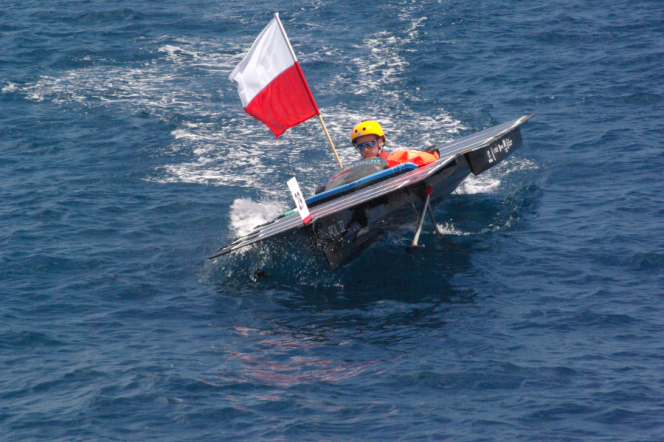Date added: 2024-07-24
Flying solar boat made by Student Club

Hydrofoil technology and operation
Solar is a hydrofoil fully powered by solar energy, derived from seven solar panels on board. Hovering above the water is made possible by the carrier lobe technology, known as hydrofoils (hydro wings). These wings generate a lifting force that lifts the hydrofoil above the surface of the water, significantly reducing drag, allowing it to reach higher speeds with less energy consumption. Thanks to this technology, the Solar can sweep over waves and has better manoeuvrability, giving it an advantage over conventional boats, which are more prone to ripples and have a more limited turning radius.
Although the conceptual and research phases of the hydrofoil work began in autumn 2017, the launch of the boat's construction began in late 2021. The process was repeatedly delayed by the pandemic, which significantly affected the pace of the project. Nonetheless, the commitment of the academic community and supporters, gradually brought successive results. Over the years, many students and enthusiasts have taken part in the project, contributed their ideas and helped with implementation.

Biggest Challenges
Working on the hydrofoil was fraught with challenges, one of the biggest was the design of the control system for the front lifting lobes. The complex physics of the phenomenon, the work between water and air and the high forces generated on the system components required months of research, CFD simulations and mathematical models.
First tests
On 7 June, after many hours of preparation and calibration of the systems, helmsman Piotr Pruszko unscrewed the manoeuvre and all the observers watched with bated breath as Solar floated above the water, cutting the water surface with only the support lobe brackets and skis. It was a dream come true moment for the whole team.
‘The tests that took place on Friday were first and foremost the answer to the most important question: will the Solar fly? It was a wonderful feeling to see the result of our work floating above the water.’ - said Alexander Longa, President of KSTO Korab.
Participation in the Monaco Energy Boat Challenge

At the beginning of July, it was time for the final test of the latest Hydrofoil, testing its capabilities in practice. On 8 July, the GUT Solar Boat Team returned from the Monaco Energy Boat Challenge - the largest and most prestigious solar boat competition in the world. This world championship rank competition, brings together teams from five continents competing in three categories: Solar Class, Energy Class and Open Sea Class.
For the KORAB team, this is their second participation in the Monaco competition, following their debut in 2015, when they finished fourth. This time the boat underwent major changes: a new hull, lighter and more efficient solar panels, a new propulsion system and battery pack and, above all, hydrofoils that significantly reduced drag.
Preparations for the launch took more than a day, after which the team proceeded with on-water testing. The conditions on the open sea were very difficult, with high waves, which made the stability of the boat very difficult.
The racing started with a boat parade, followed by the competitions. Technical problems forced the team to return to the paddock before the first start. In the Speed Record competition, despite engine difficulties, the team placed 8th. Their best result was in the Slalom, placing 7th, and they finished the whole competition in 10th position.
The Monaco Energy Boat Challenge was an amazing experience for the team, giving them the impetus to continue improving their boat. The team is already thinking about the next version of the ‘solar’ from Gdansk, so they can score even higher at future competitions.



